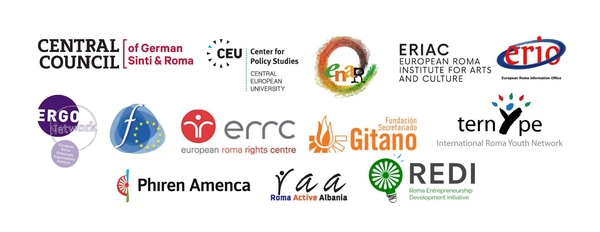Appeal to the European Commission and the European Council to make the post-2020 EU Strategic Framework for Roma Equality and Inclusion a top priority in its Covid-19 response
Download the pdf version.
April 22, 2020
Honorable President of the European Commission, Ms Ursula von der Leyen
Honorable President of the European Council, Mr Charles Michel
On behalf of the European coalition of Roma and pro-Roma organizations, we call on the European Commission and the European Council to prioritise fundamental rights and the protection of the most vulnerable when redefining the EU agenda in light of the ongoing Covid-19 pandemic. In particular, we urge EU leaders to address the following three priorities in order to ensure the equal treatment, safety, well-being and equality of Roma communities and thereby contribute to ameliorating the pandemic situation for all Europeans:
- An immediate European humanitarian response should coordinate and allocate sufficient resources to all vulnerable groups, in particular marginalized Roma communities and all racialized minorities, making sure they are reached in all Member States and enlargement countries.
- The European Covid-19 Recovery Plan should fully take into account the needs of vulnerable Roma communities, and define them as a priority group in all mainstream policies and measures, including in economic aid and recovery, social protection, health care, housing, education and employment.
- A post-2020 “EU Strategic Framework for Roma Equality, Social and Economic Justice and Combating Antigypsyism” must constitute a top priority in the Covid-19 response of the EU, Member States and Enlargement countries in order to comprehensively address the structural exclusion, inequality and vulnerability of Roma communities, that was dramatically exposed by the Covid-19 pandemic.
The Post-2020 European Roma Coalition signals its concerns about the negative consequences of a possible delay of human and minority rights initiatives, including the post-2020 EU Roma Strategic Framework, due to COVID-19. Such a delay will have a tremendously negative effect on the human rights and protection of vulnerable groups such as Roma. The Coalition calls on the European Commission and Council not to risk the safety, well-being and equality of 12 million Roma in the European Union and Enlargement Countries in a hasty decision to save resources.
Since the outbreak of Covid-19, under the social distancing and public health measures, many Roma working in the informal sector lost their sources of daily income (such as working in private fields, collecting and selling scrap metal, small traders, market sellers; those working in the arts and culture, as musicians, cultural producers, artisans etc.). Rampant antigypsyism, including hate speech by the media and racist violence against Roma is increasing rapidly in many Member States and Enlargement Countries, particularly in Austria, Bulgaria, Hungary, North Macedonia, Romania, Serbia and Slovakia. In addition, measures of confinement are being applied disproportionately by some authorities, who argue that Roma communities are responsible for spreading the virus more rapidly, (e.g., in Bulgaria and Romania mayors organised checkpoints to control the movement from and to Roma neighbourhoods, including by sealing checkpoints with concrete in Kazanluk, Bulgaria to make the neighbourhood accessible only through the checkpoints).
There is a real danger that, as we move globally deeper into an imminent economic and humanitarian crisis, the needs and concerns of minority groups will be overlooked by governments. European and international efforts to curb the spread of the coronavirus and mitigate its long-term economic and social consequences should start with addressing racial inequalities and achieve social justice for all.
Now more than ever, Europe needs a prompt, robust and binding post-2020 EU Roma Strategic Framework for Roma Equality, Inclusion and Combating Antigypsyism that prioritises minimum adequate standards, targets and indicators in the areas of education, employment, health, social protection, housing and fighting antigypsyism, and that includes equally Enlargement and Neighborhood Countries to guarantee a level playing field in the access to basic rights and services. A delay in the adoption of the EU Roma Strategy because of the Covid-19 pandemic is not justified, since social inequalities and racism against Roma to date are now impacting disproportionately on Roma who live in squalid conditions, without running water, without income and food supplies, and at a much higher risk of infection and spread of the coronavirus. Prioritising the EU Roma Strategy is not only a moral and human rights duty towards Roma, it is also the right way to contain and minimise the impact of the pandemic for millions more citizens and residents that need EU support to push their Member States and Enlargement Countries to take action. [Follow the CSO response on the Roadmap] Moreover, delaying the adoption of the EU Roma initiative creates a risk that the future European framework as well as the consequent national Roma inclusion strategies will not be adequately integrated into the designing and implementation of the new cohesion policy or the post-crisis recovery policy.
The post-2020 European Roma Coalition with the support of
Central Council of German Sinti and Roma
Center for Policy Studies, Central European University (CEU)
European Network Against Racism (ENAR)
European Roma and Travellers Forum (ERTF)
European Roma Grassroots Organisations (ERGO) Network
European Roma Information Office (ERIO)
European Roma Institute for Arts and Culture (ERIAC)
European Roma Rights Centre (ERRC)
Fundacion Secretariado Gitano (FSG)
International Roma Youth Network, TernYpe
Phiren Amenca International Network
Roma Active Albania (RAA)
Roma Entrepreneurship Development Initiative (REDI)






